Research
Infographic
Recognizing Faculty with Disabilities: Data and Considerations from the Faculty Job Satisfaction Survey
Drawing upon Faculty Job Satisfaction Survey data from 2019 and 2020, this piece examines meaningful differences in perception of the academic workplace between faculty with visible disabilities, invisible disabilities, and no reported disabilities.
Case Study
Supporting the Next Generation of Faculty at Georgia State University
In this partner spotlight, Georgia State University shares how the institution applied its data-driven approach to student success to the faculty experience through the administration and rollout of the Faculty Job Satisfaction Survey.
Webinar
Success After Tenure: Lessons in Engaging Mid-Career Faculty
Based on the 2018 book, Success After Tenure: Supporting Mid-Career Faculty (Stylus), this webinar highlights the impetus behind compiling the volume, as well as the successful practices put in place by COACHE partners at Rochester Institute of Technology.
Browse Resources By Topic
- Faculty Development & Support
- Diversity, Equity, & Inclusion
- Higher Education Leadership
- Recruitment & Retention
The workplace satisfaction of newly-tenured faculty members at research universities
Citation:
Thesis Type:
DissertationAbstract:
If faculty are dissatisfied with their work, colleges and universities can experience educational and organizational repercussions that include contentious departmental climates and stagnant work productivity. The dissatisfaction of newly tenured faculty, who face unique transitional circumstances, could have particularly negative consequences.
This dissertation uses Faculty Job Satisfaction Survey data, along with interviews of 12 newly tenured faculty members, to estimate the predictors of newly tenured faculty workplace satisfaction. The results indicate that newly-tenured faculty tend to be satisfied with their institutions when they have communicative senior leaders, fair and reasonable compensation, and a sense of belonging in their departments. At the departmental level, newly-tenured faculty are more likely to be satisfied when norms and behaviors promote inclusion and diversity, colleagues are respectful, and departmental leaders are supportive. The results of this study can stimulate thinking about new policies and practices to maximize the satisfaction and performance of faculty during this transformative period in their careers.
Success on the Tenure Track: Five Keys to Faculty Job Satisfaction
Citation:
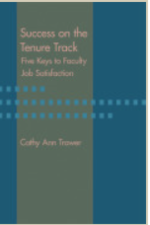
Abstract:
Landing a tenure-track position is no easy task. Achieving tenure is even more difficult. Under what policies and practices do faculty find greater clarity about tenure and experience higher levels of job satisfaction? What makes an institution a great place to work?
In 2005–2006, the Collaborative on Academic Careers in Higher Education surveyed more than 15,000 tenure-track faculty at 200 institutions. The survey was designed around five key themes: tenure clarity, work-life balance, support for research, collegiality, and leadership.
Success on the Tenure Track positions the survey data in the context of actual colleges and universities. Best practices at the highest-rated institutions in the survey—Auburn, Ohio State, North Carolina State, Illinois at Urbana-Champaign, Iowa, Kansas, and North Carolina at Pembroke—give administrators practical, proven advice on increasing employee satisfaction. Additional chapters discuss faculty demographics, trends in employment practices, creating a great workplace for faculty, and the future of tenure.
Gen X Meets Theory X: What New Scholars Want
Citation:

Abstract:
“If they can’t understand that I want a kick-ass career and a kick-ass life, then I don’t want to work here,” sums up how many Generation X’ers (born between 1965 and 1980) view their workplace, according to Lancaster and Stillman. As a group, Gen X’ers are willing to work hard but want to decide when, where, and how. As this generation enters the professoriate in large numbers, some institutions may be wondering what hit them.
This study measured the importance of 19 job factors to recent graduates of doctoral degree programs. The primary considerations of recent graduates when choosing a job were: finding a situation in which they could do meaningful work and strike a balance between teaching and research; quality of living conditions, e.g., affordability of housing, commute, good K-12 schools, community feeling and safety, and job opportunities for spouse or partner; and balance between work and home life.
Perspectives on What Pre-Tenure Faculty Want and What Six Research Universities Provide
Citation:
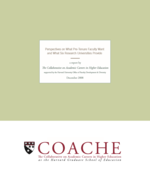
Abstract:
COACHE released this report in conjunction with the Harvard University Office for Faculty Diversity & Development. It is the result of many months of mining and synthesizing the information collected from nearly 80 interviews with pre-tenure and tenured faculty, department chairs, and senior administrators at six COACHE member campuses. Much of what is contained in this report may be all too familiar to an experienced academic administrator, but it is the first time the experiences of early-career faculty and the faculty development policies of top-tier research universities have been assembled in one place.- «
- 5 of 5
The role of citizenship status in intent to leave for pre-tenure faculty
Citation:
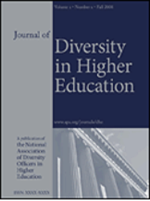
Abstract:
Using a national database, this study uses discriminant analysis to explore the role of citizenship status in determining intent to leave for pre-tenure faculty members at 4-year research universities. Of the three possible responses (intend to stay, intend to leave, and undecided), two functions emerged. The first function differentiates those who intend to stay from those who intend to leave and those who are undecided. The second function differentiates between those who intend to leave and those who are undecided.
Measures of satisfaction with workplace serve as the primary indicators of function one. Race and citizenship status are the only variables significant for function two. Demographic variables, discipline, salary, and institutional variables are not significant in either function. The variables that are significant for the entire sample are similar to those significant just for non-U.S. citizen faculty. Implications of this study for institutions include attending to departmental and institutional fit, recognition of diversity among non-U.S. citizen faculty, and working toward improving various components of satisfaction.
Examining faculty satisfaction, productivity, and collegiality in higher education: Contemporary contexts and modern methods
Citation:
Thesis Type:
DissertationAbstract:
In response to discourse surrounding faculty accountability and diversity, this dissertation describes three studies of faculty satisfaction, productivity, and collegiality in higher education. The studies employed advanced quantitative methods to analyze and interpret faculty data at four-year colleges and universities.
The first study revealed a strong, positive, and highly significant relationship between campus racial climate and faculty satisfaction at the individual level, regardless of gender, race/ethnicity, and tenure status. The second study identified five classes of faculty productivity with respect to gender, race, institutional type, and levels of faculty satisfaction.
The third study examined the relationships among faculty collegiality, job satisfaction, and turnover intentions. Significant findings indicated that faculty collegiality was strongly and positively related to job satisfaction and negatively related to turnover intentions, regardless of gender and race/ethnicity. Women faculty and faculty of color indicated lower levels of collegiality, and faculty of color reported lower job satisfaction and higher turnover intentions.
Success on the Tenure Track: Five Keys to Faculty Job Satisfaction
Citation:

Abstract:
Landing a tenure-track position is no easy task. Achieving tenure is even more difficult. Under what policies and practices do faculty find greater clarity about tenure and experience higher levels of job satisfaction? What makes an institution a great place to work?
In 2005–2006, the Collaborative on Academic Careers in Higher Education surveyed more than 15,000 tenure-track faculty at 200 institutions. The survey was designed around five key themes: tenure clarity, work-life balance, support for research, collegiality, and leadership.
Success on the Tenure Track positions the survey data in the context of actual colleges and universities. Best practices at the highest-rated institutions in the survey—Auburn, Ohio State, North Carolina State, Illinois at Urbana-Champaign, Iowa, Kansas, and North Carolina at Pembroke—give administrators practical, proven advice on increasing employee satisfaction. Additional chapters discuss faculty demographics, trends in employment practices, creating a great workplace for faculty, and the future of tenure.
Gender and Race Differences in Faculty Assessment of Tenure Clarity: The Influence of Departmental Relationships and Practices
Citation:
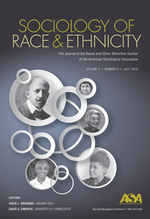
Abstract:
The authors look at how the intersection of gender and race influences pre-tenure faculty members’ perceptions of the clarity of tenure expectations. The authors also seek to identify potential predictors (assessment of mentoring, relationships with peers, feedback on progress toward tenure, and fairness in tenure decision making and evaluation) of perceptions of tenure clarity for four intersectionally defined groups, including historically underrepresented minority women (URMW). The authors use an intersectional perspective and the gendered and racialized organizations’ theoretical lens to interpret the results. The data set comes from the Faculty Job Satisfaction Survey. Findings show that compared with white men, URMW are less satisfied with their relationships with peers and with the fairness in the evaluation of their work. They are also less likely to agree that mentoring is effective, that tenure decisions are fair, and that messages about tenure are consistent.International Faculty Perceptions of Departmental Climate and Workplace Satisfaction
Citation:
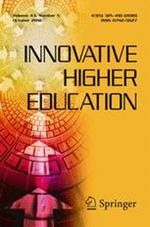
Abstract:
Although the variability in the definitions and immigration status of international academics makes it challenging to provide the exact number of foreign-born faculty members teaching and conducting research in U.S. postsecondary institutions, all data accounts have pointed to a steady growth in this segment of the professoriate. This study used data from the 2011-2014 Faculty Job Satisfaction Survey to examine international faculty members’ satisfaction with autonomy, interactions with colleagues, departmental climate, and recognition and the effect of these elements upon the overall workplace satisfaction of international faculty members relative to their U.S. citizen peers.
This study helps identify factors that can enhance international faculty members’ satisfaction in order to aid institutions in their efforts not only to recruit the best talent but also to support and retain such talent.
Climate Change: Creating Space for Interdepartmental Problem Solving at Skidmore College
Citation:
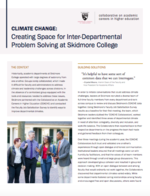
Abstract:
Historically, academic departments at Skidmore College operated with large degrees of autonomy from one another. Groups rarely collaborated, which made it difficult for faculty and administrators to address climate and leadership challenges across divisions. In the absence of a centralized group equipped with the tools and resources needed to address these issues, Skidmore partnered with the Collaborative on Academic Careers in Higher Education (COACHE) and conducted the Faculty Job Satisfaction Survey to identify ways to improve departmental climates.
Using Skidmore’s survey results as a baseline for their first meeting, the team, which Skidmore leaders dubbed the ‘COACHE Collaborators’, worked together to identify three areas of departmental climate in need of attention: collegiality, diversity and inclusion, and work-life balance.
Browse Resources by Faculty Type
Academic nursing administrators' workplace satisfaction and intent to stay
Citation:
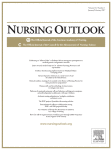
Abstract:
Engineering a place for women: A study of how departmental climate influences the career satisfaction of female mechanical engineering faculty members
Citation:
Thesis Type:
DissertationAbstract:
The purpose of this mixed-methods study was to better understand how female mechanical engineering faculty members’ career experiences in academia affect their satisfaction. The research considered differences in satisfaction reported by female and male mechanical engineering faculty members in terms of departmental climate, nature of work, resource allocations, departmental policies/practices, and overall satisfaction.
The study compared the levels of satisfaction reported in survey data collected through the Faculty Job Satisfaction Survey from 2005-2010. A subset of the survey participants was interviewed to gain nuanced descriptions of faculty member worklife.
This study identified the role of gendered divisions of labor, gendered divisions of allowed behavior, gendered symbols, and gendered interactions as reasons why female mechanical engineering faculty members are less satisfied with employment in academia than their male colleagues. Recommendations for how mechanical engineering leadership can improve the climate in the department include transparency in decision-making and encouraging senior faculty members to engage in constructive, collaborative research conversations with junior faculty members.
The Experience of Tenure-Track Faculty at Research Universities: Analysis of COACHE Survey Results by Academic Area and Gender
Citation:
Abstract:
The COACHE Faculty Job Satisfaction Survey is organized around five themes: tenure, nature of the work, policies and practices, climate, culture, and collegiality, and global satisfaction. This analysis looks at survey data for pre-tenure faculty at research universities. In particular, the analysis examined gender differences across twelve academic areas. Mean scores for each of the 83 survey dimension were ranked across all 12 academic areas.
- «
- 2 of 2
Family policies and institutional satisfaction: An intersectional analysis of tenure-track faculty
Citation:
Thesis Type:
DissertationAbstract:
Guided by an intersectional perspective, this study compares responses to the 2008 and 2009 Tenure-Track Faculty Job Satisfaction survey provided by four groups of faculty: African American women, African American men as well as white women and white men. The study examines faculty perceptions regarding the importance of family policies as related to career success, the effectiveness of family policies at the institution, and the level of satisfaction with work-life balance. The findings indicate that there are significant differences in policy perceptions and work-life satisfaction. African American women overwhelmingly indicate that eldercare policy is important to career success, while white women are more concerned with childcare policy. Significant group differences emerge in faculty assessment of childcare policy. The analysis reveals institutional-level support for care work influences overall satisfaction with the institution more than departmental support. The findings suggest care work still matters in relation to a faculty member's career advancement.
Intent to leave the professoriate: The relationship between race/ethnicity and job satisfaction for pre-tenured professors in doctorate-granting universities
Citation:
Thesis Type:
DissertationAbstract:
This study investigated pre-tenure faculty satisfaction and intent to leave their institution using 2005–2008 data from the Faculty Job Satisfaction Survey. The purpose of this study is to identify salient variables influencing faculty of color retention and to explain the lack of progress in diversifying the professoriate by exploring the relationship between racial/ethnic group membership and pre-tenure faculty job satisfaction and the relationship these variables have with departure intentions. The study was limited to faculty working at doctorate-granting U.S. universities.
Results of the study suggest faculty of color are more likely to intend to leave their institutions than their White (non-Hispanic) counterparts. Specifically, the study's findings suggest satisfaction with tenure processes and procedures, teaching, advising, service, and research expectations, and collegiality negatively influenced departure intentions of pre-tenure faculty overall and for specific racial/ethnic groups. The study offers ideas for expanded research on pre-tenure faculty job satisfaction and intent to leave.
Career Stage Differences in Pre-Tenure Track Faculty Perceptions of Professional and Personal Relationships with Colleagues
Citation:
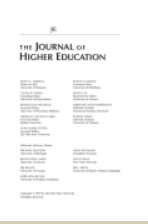
Abstract:
Despite a steady decline in available faculty tenure-track positions, future vacancies in tenure-track positions provide opportunities to diversify faculty ranks with new female faculty and faculty of color. This impending employment shift in faculty demographics may change departmental climates, pre-tenure faculty socialization processes, and professional and personal relationships between pre-tenure female faculty and faculty of color and their colleagues.
This study examines pre-tenure faculty members' perception of collegial relationships with colleagues. We primarily focus on the organizational socialization of female faculty and faculty of color, and faculty in different pre-tenure career stages. We found differences in satisfaction with collegial relationships between faculty by gender, race, and pre-tenure career stages.
Work–Family Balance and Tenure Reasonableness: Gender Differences in Faculty Assessment
Citation:
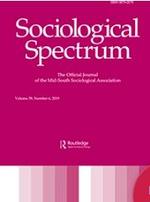
Abstract:
Perceptions of work–family balance and of the reasonableness of tenure expectations are key faculty retention factors. Using the Faculty Job Satisfaction Survey, which includes data from 2,438 tenure-track assistant professors, Rodica Lisnic, Anna Zajicek, and Brinck Kerr explore whether faculty assessment of departmental and institutional support for family influences their perceptions of the reasonableness of tenure expectations.
Results reveal that women are less likely than men to report tenure expectations as scholars are reasonable and that departments and institutions are supportive of family-work balance. Departmental support for family-work balance, caring for an ill family member, satisfaction with family-friendly policies, and workload have the strongest association with reasonableness. Satisfaction with family-friendly policies has a significant relationship with reasonableness of tenure expectations only for faculty with family care responsibilities. These results have implications for family-friendly policies and practices in academia.
Gender and Race Differences in Faculty Assessment of Tenure Clarity: The Influence of Departmental Relationships and Practices
Citation:

Abstract:
The authors look at how the intersection of gender and race influences pre-tenure faculty members’ perceptions of the clarity of tenure expectations. The authors also seek to identify potential predictors (assessment of mentoring, relationships with peers, feedback on progress toward tenure, and fairness in tenure decision making and evaluation) of perceptions of tenure clarity for four intersectionally defined groups, including historically underrepresented minority women (URMW). The authors use an intersectional perspective and the gendered and racialized organizations’ theoretical lens to interpret the results. The data set comes from the Faculty Job Satisfaction Survey. Findings show that compared with white men, URMW are less satisfied with their relationships with peers and with the fairness in the evaluation of their work. They are also less likely to agree that mentoring is effective, that tenure decisions are fair, and that messages about tenure are consistent.Gender Differences in Faculty Member Job Satisfaction: Equity Forestalled?
Citation:

Abstract:
Guided by Hagedorn’s (2000) theory of faculty job satisfaction, mindful of social and organizational structures of higher education, and acknowledging recent changes in the academic labor market, this study examines satisfaction for approximately 30,000 tenured and tenure-track faculty members in 100 US colleges and universities. Findings revealed similarity between female and male faculty members in some aspects of work satisfaction, but difference in other areas in which women reported lower satisfaction. Findings also revealed that perceptions of department fit, recognition, work role balance, and mentoring are more important to women faculty’s satisfaction than male peers. These findings have implications for policy and practice.
- 1 of 6
- »
Clear as Mud: Promotion Clarity by Gender and BIPOC Status Across the Associate Professor Lifespan
Citation:
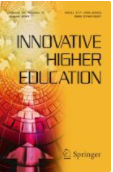
Abstract:
Mid-career faculty members often seek to advance to the highest faculty rank of full professor, but research suggests women and Black, Indigenous and Other People of Color (BIPOC) faculty face inequitable patterns in advancement to the full professor rank. This study focuses on associate professors’ perceptions of promotion clarity, or the degree to which they are clear about the processes and criteria for advancing to the full professor rank.Success After Tenure: Lessons in Engaging Midcareer Faculty
Citation:
Abstract:
Mid-career faculty actively seek professional satisfaction and personal well-being in their careers at the departmental and institutional level. However, a growing body of research tells us that the policies and practices in place at colleges and universities do not always support this goal. This webinar, “Success After Tenure: Lessons in Engaging Mid-Career Faculty,” offers an inside take on the themes of the book Success After Tenure: Supporting Mid-Career Faculty and provide real-world best practices from practitioners in the field.
Full Text
Watch the Recording
Download the presentation slides
Evidence-Based Faculty Development: The COACHE Research-Practice Partnership
Citation:
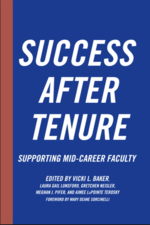
Abstract:
This book brings together leading practitioners and scholars engaged in professional development programming for and research on mid-career faculty members, those tasked with being the next generation of faculty leaders and mentors on their respective campuses, with little to no supports to do so effectively.
The stories, data, and resources shared in this book will provide inspiration—and reality checks—to administrators, faculty developers, and department chairs charged with supporting their faculties as they engage in academic work. Topics include faculty development for formal and informal leadership roles; strategies to support professional growth; teaching and learning as a form of scholarship; and strategies to recruit, retain, and promote underrepresented faculty populations.
While the authors acknowledge that mid-career faculty members face numerous challenges, this collection offers a counter narrative by looking at ways that faculty and/or institutions can assert themselves to find opportunities within challenging contexts.
- 1 of 5
- »
Clear as Mud: Promotion Clarity by Gender and BIPOC Status Across the Associate Professor Lifespan
Citation:

Abstract:
Mid-career faculty members often seek to advance to the highest faculty rank of full professor, but research suggests women and Black, Indigenous and Other People of Color (BIPOC) faculty face inequitable patterns in advancement to the full professor rank. This study focuses on associate professors’ perceptions of promotion clarity, or the degree to which they are clear about the processes and criteria for advancing to the full professor rank.Women Faculty in STEM Disciplines: Experiences with the Tenure Process and Departmental Practices
Citation:
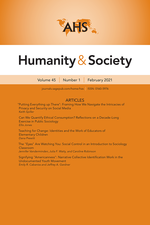
Abstract:
Using Faculty Job Satisfaction Survey data, the purpose of the study is to explore predictors of perceptions of tenure clarity for faculty in STEM and non-STEM fields. We use the gendered organization framework to examine whether for four groups of faculty (women and men in STEM and women and men in non-STEM), assessment of fairness in tenure decisions and evaluations, messages about tenure requirements, mentoring, and relationships with peers have a similar effect on their assessment of tenure clarity. Women in STEM fields are less likely to perceive the expectations for tenure as clear or to assess tenure decisions and evaluations as fair, mentoring as effective, and relationships with peers as satisfactory.Work–Family Balance and Tenure Reasonableness: Gender Differences in Faculty Assessment
Citation:

Abstract:
Perceptions of work–family balance and of the reasonableness of tenure expectations are key faculty retention factors. Using the Faculty Job Satisfaction Survey, which includes data from 2,438 tenure-track assistant professors, Rodica Lisnic, Anna Zajicek, and Brinck Kerr explore whether faculty assessment of departmental and institutional support for family influences their perceptions of the reasonableness of tenure expectations.
Results reveal that women are less likely than men to report tenure expectations as scholars are reasonable and that departments and institutions are supportive of family-work balance. Departmental support for family-work balance, caring for an ill family member, satisfaction with family-friendly policies, and workload have the strongest association with reasonableness. Satisfaction with family-friendly policies has a significant relationship with reasonableness of tenure expectations only for faculty with family care responsibilities. These results have implications for family-friendly policies and practices in academia.
- 1 of 5
- »
Browse Resources by Type
Clear as Mud: Promotion Clarity by Gender and BIPOC Status Across the Associate Professor Lifespan
Citation:

Abstract:
Mid-career faculty members often seek to advance to the highest faculty rank of full professor, but research suggests women and Black, Indigenous and Other People of Color (BIPOC) faculty face inequitable patterns in advancement to the full professor rank. This study focuses on associate professors’ perceptions of promotion clarity, or the degree to which they are clear about the processes and criteria for advancing to the full professor rank.Women Faculty in STEM Disciplines: Experiences with the Tenure Process and Departmental Practices
Citation:

Abstract:
Using Faculty Job Satisfaction Survey data, the purpose of the study is to explore predictors of perceptions of tenure clarity for faculty in STEM and non-STEM fields. We use the gendered organization framework to examine whether for four groups of faculty (women and men in STEM and women and men in non-STEM), assessment of fairness in tenure decisions and evaluations, messages about tenure requirements, mentoring, and relationships with peers have a similar effect on their assessment of tenure clarity. Women in STEM fields are less likely to perceive the expectations for tenure as clear or to assess tenure decisions and evaluations as fair, mentoring as effective, and relationships with peers as satisfactory.Faculty Perceptions of Work-Life Balance: The Role of Marital/Relationship and Family Status
Citation:
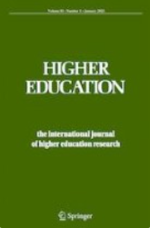
Abstract:
This study examined correlates of work-life balance perceptions for faculty from various marital/relationship and family statuses using data from the Collaborative on Academic Careers in Higher Education Faculty Job Satisfaction Survey. We found lower work-life balance among single (rather than married/partnered) faculty. These findings call for colleges and universities to directly address the work-life struggles of single faculty members with and without children. Our findings also underscore the importance of institutional support for making personal/family obligations and an academic career compatible for all faculty.COACHE Summary Tables 2014: Selected Dimensions on Faculty Workplace Climate by Discipline, Race/Ethnicity, and Gender
Citation:
Abstract:
These tables present data from the 2014 Faculty Job Satisfaction Survey focusing on workplace climate, including responses to questions about workload, mentoring, departmental engagement, collaboration, and clarity around tenure decisions. Results are disaggregated by department, race/ethnicity, and gender.Full Text
Download the summary tables
Faculty Job Satisfaction Survey Data Snapshots
Citation:
Abstract:
These charts present data from the 2013 Faculty Job Satisfaction Survey, focusing on results across seven public universities. The charts represent the arithmetic mean, by academic area and by rank and tenure status, of select COACHE survey results. "NTT” faculty are full- time, non-tenure-track faculty. All items were rated by respondents on a five-point scale of satisfaction, agreement, etc. Thus, for example, faculty were asked not to report the number of courses they teach, but to rate their satisfaction with the number of courses they teach.
The Experience of Tenure-Track Faculty at Research Universities: Analysis of COACHE Survey Results by Academic Area and Gender
Citation:
Abstract:
The COACHE Faculty Job Satisfaction Survey is organized around five themes: tenure, nature of the work, policies and practices, climate, culture, and collegiality, and global satisfaction. This analysis looks at survey data for pre-tenure faculty at research universities. In particular, the analysis examined gender differences across twelve academic areas. Mean scores for each of the 83 survey dimension were ranked across all 12 academic areas.
Examining the Impacts of COVID-19 on Faculty Retention & Exit
Citation:
Abstract:
For the last five years, the Collaborative on Academic Careers in Higher Education (COACHE) has been conducting the Faculty Retention and Exit Survey to gain a deeper understanding of the academic work environment by examining faculty mobility. In spring 2020, we added three COVID-19-related questions to the survey to capture the early effects of the pandemic.
In this webinar, Doctoral Fellow, Mai H. Vang, presents findings from the responses to those questions, which captured nine themes, including disruption of research, disconnection due to remote work, and inequities in the pandemic’s impact on particular faculty.
Download the full report of our findings and presentation slides
Full Text
Assessing the Needs of Part-Time Faculty: Lessons Learned from the University at Buffalo
Citation:
Abstract:
According to the American Association of University Professors (AAUP), approximately 40% of all faculty across all institutional types are now part-time. This subset of adjunct faculty is fulfilling a critical role in the higher education landscape, yet the variability of these appointments makes it exceedingly difficult to assess their needs and, ultimately, provide adequate support.
In 2017, COACHE partners at the University at Buffalo set out to address this knowledge gap by adapting the Faculty Job Satisfaction Survey to suit the needs of their part-time faculty. In this webinar, Robert Granfield and Tilman Baumstark will share the challenges faced and lessons learned, both from their methodology and from their faculty, throughout this endeavor.
Success After Tenure: Lessons in Engaging Midcareer Faculty
Citation:
Abstract:
Mid-career faculty actively seek professional satisfaction and personal well-being in their careers at the departmental and institutional level. However, a growing body of research tells us that the policies and practices in place at colleges and universities do not always support this goal. This webinar, “Success After Tenure: Lessons in Engaging Mid-Career Faculty,” offers an inside take on the themes of the book Success After Tenure: Supporting Mid-Career Faculty and provide real-world best practices from practitioners in the field.
Full Text
Watch the Recording
Download the presentation slides
- 1 of 2
- »
Faculty Departure and Retention at Small Liberal Arts Colleges
Citation:
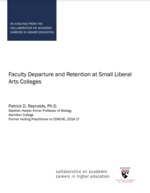
Abstract:
Voluntary faculty departures can often be prevented, but a lack of common exit procedures have hindered institutions’ ability to create proactive practices of faculty retention and instead harbor reactive tendencies with little positive outcome. Through interviews with 22 CAOs at liberal arts colleges, Patrick D. Reynolds, former Visiting Practitioner to COACHE, discovered partner employment and career choice were the two most prominent reasons for departures. Outliers also revealed that work and social environments, especially for faculty members of minority groups, often played a role in dissatisfaction.
Effective Academic Governance: Five Ingredients for CAOs and Faculty
Citation:
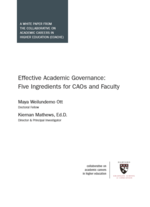
Abstract:
The COACHE research-practice partnership is designed to enact organizational change for the benefit of faculty and, by extension, the institution. But does every college's system of shared governance have what it takes to meet their own or, indeed, higher education’s most pressing challenges? This white paper looks beyond the rhetoric toward a more differentiated understanding of the ingredients of effective academic governance. Ott and Mathews offer a five-factor framework grounded in the literature, developed from interviews, and, now, tested in a survey of thousands of faculty. The report concludes with advice for assessing and fostering the qualities of “hard” and “soft” governance practices essential to sustainable change in the “real world” decision-making of committees, assemblies, senates, councils, and unions.Benchmark Best Practices: Tenure and Promotion
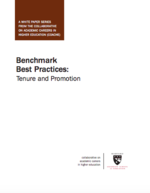
Abstract:
The COACHE surveys of college faculty produce data that are both salient to full-time college faculty and actionable by academic leaders. The survey items are aggregated into 20 benchmarks representing the general thrust of faculty satisfaction along key themes. This white paper discusses the themes of tenure policies, tenure clarity, and promotion.
Administrators and faculty alike acknowledge that, at most institutions, the bar to achieve tenure has risen over time. While it is impossible to eliminate anxiety from the minds of all pre-tenure faculty members, or the pressures exerted on their lives en route to tenure, academic leaders can improve the clarity of tenure policies and expectations without sacrificing rigor. And while the academy has recently improved many policies for assistant professors (e.g., research leave; stop-the-tenure-clock; part-time tenure-track options), it has done far less for associate professors. Ideas have emerged from COACHE research on tenured faculty.
- 1 of 5
- »

